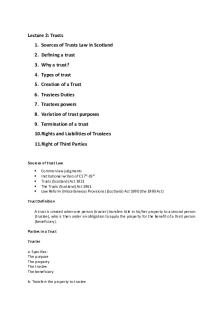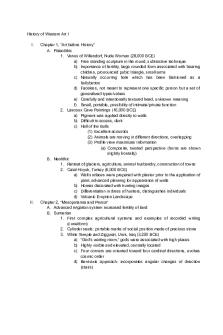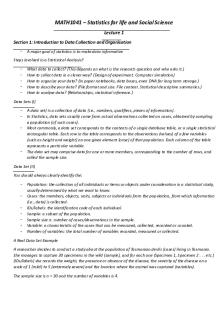Chapter-6-Memory - notes PDF

| Title | Chapter-6-Memory - notes |
|---|---|
| Author | Logan Phil |
| Course | Introduction to Psychology |
| Institution | Mount Royal University |
| Pages | 9 |
| File Size | 185.2 KB |
| File Type | |
| Total Downloads | 49 |
| Total Views | 146 |
Summary
notes...
Description
Chapter 6 – Memory -
Memory: The ability to store and retrieve information over time.
-
Memory as Learning: Learning can be with or without awareness classical/ operant /observational possible combinations / interactions - important as we need to recognize REMEMBERING is a step in learning.
-
Memories are constructed
-
Memories can be changed
-
Combination of old and new information
-
Different types of memory are dependent on different parts of the brain
Types of Memory Sensory Memory
More on these memories below in notes A type of storage that holds sensory information for a few seconds or less
Iconic Memory
A fast decaying store of visual information
Echoic Memory
A fast decaying store of auditory information
Short Term Memory Working Memory Long Term Memory
A type of storage that holds nonsensory information for more than a few seconds but less than a minute. Active maintenance of information in short- term storage. A type of storage that holds information for hours, days, weeks, or years.
Semantic Memory
A network of associated facts and concepts that make up our general knowledge of the world.
Episodic Memory
The collection of past personal experiences that occurred at a particular time and place.
Prospective Memory Flashbulb Memories Explicit Memory Implicit Memory
Remembering to do things in the future. Detailed recollections of when and where we heard about shocking events. When people consciously or intentionally retrieve past experiences Occurs when past experiences influence later behavior and performance even without an effort to remember them or an awareness of the recollection.
Functions of Memory:
Encoding Storage
Retrieval
The process of transforming what we perceive, think, or feel into an enduring memory. The process of maintaining information in memory over time The process of bringing to mind information that has been previously encoded and stored
Three types of Encoding: - Semantic Encoding: The process of relating new information in a meaningful way to knowledge that is already stored in memory. Associated with increased activity in the lower left part of the frontal lobe AND the inner part of the left temporal lobe.
-
Visual Imagery Encoding: The process of storing new information by converting it into mental pictures. Studies have shown visual imagery can improve memory. Takes place in processing reasons in the occipital lobe.
-
Organizational Encoding: The process of categorizing information according to the relationships among a series of items. Occurs in the upper surface of the left frontal lobe.
-
Encoding of Survival/ Survival Encoding: Draws on elements of semantic, visual imagery, and organizational encoding which may give it an advantage over any one of the other three. Engages participants to engage an extensive planning, which in turn benefits memory.
Storage: Maintaining Memories over Time: -
Three major kinds of storage units, Sensory, Short-Term, Long-Term. These are distinguished primarily by the amount of time over which a memory is retained
-
Sensory memory: Type of storage that holds sensory information for a few seconds or less.
-
Because we have more than one sense, we have more than one kind of sensory memory
-
Iconic memory: Fast decaying store of visual information. Decay in 1 second or less.
-
Echoic memory: Fast-decaying store of auditory information Decay in about 5 seconds.
-
Think of iconic memories and Echoic memories as “Free Ice-Cream Stands” if you want one, act/grab them fast.
Short Term Storage and Working Memory -
Short Term Memory: Holds NONSENSORY information for more than a few seconds but less than a minute. Also not limited to numbers, it can hold SEVEN MEANINGFUL things at once
-
Rehearsal: Is the process of keeping information in short-term memory by mentally repeating it
-
You get told a cell phone number, and you can repeat if for a few seconds with ease But if interrupted you forget it (Short Term Memory). But every time you say the number you are reentering it into your short term memory (Rehearsal)
-
Chunking: Combining small pieces of information into larger clusters or chunks that are more easily held in short term memory. (In order to remember several things)
-
Working Memory: Active maintenance of information in short-term storage. Includes subdivides that store and manipulate visual images or verbal information as well as a central executive that coordinates the subsystems.
Long Term Storage -
Contrast to sensory memory and short term memory
-
Long Term Memory: Type of storage that holds information for hours, days, weeks, or years.
-
No known capacity limits unlike short term and sensory memory
-
Hippocampal Region: critical for putting new information into the long term store. Important when a new memory is formed, may become less important as the memory ages. Involved over a long period of time with some memories, but does not stay involved in less detailed, and more general memories.
Sensory Memory -> Short Term Memory -> Long term Memory
Consolidation
Reconsolidatio n
Consolidation/Reconsolidation Hippocampus becomes less important closely related. The process by which memories become more stable in the brain Memories can be vulnerable to disruption when they are recalled, requiring them to become consolidated again
Shortly after encoding memories exist in a fragile state where they can be disrupted once consolidation has occurred, they are more resistant to disruption. A memory becomes consolidated by recalling, thinking about it, and talking about it. Each time a memory is retrieved however, the more vulnerable to disruption it become
Amnesia Anterograde Amnesia Happens when the Hippocampal Region is damaged. The Inability to transfer new information from the short term store into the long term store Retrograde Amnesia
Individuals with amnesia also suffer from this. The inability to retrieve information that was acquired before a particular date, usually the date of an injury or surgery.
Memories, Neurons, and Synapses -
Research suggests that memory storage depends critically on the spaces between neurons
-
Synapse: Small space between the axon of one neuron and the dendrite of another.
-
Similar process of synaptic strengthening happens in the hippocampus (The hippocampus is crucial for creating new long term memories)
-
Long Term Potentiation: A process whereby communications across the synapse between neurons strengthens the connection making further communication easier.
Retrieval: Bringing Memories to Mind -
Retrieval is the process of bringing to mind information that has been previously encoded and stored
Retrieval Cue
State Dependent Retrieval
Reinstating the Past Encounter information outside your head that is somehow connected to information inside your head. “External information that is associated with stored information and helps bring it to mind. Tendency for information to be better recalled when the person is In the same state during encoding and retrieval.
Retrieval clues can help inaccessible information to mind
If you are sad, it increases the likelihood you will retrieve sad memories/episodes.
Encoding Specificity Principle
The idea that a retrieval cue can serve as effective reminder when it helps re-create the specific way in which information was initially
Transfer Appropriate processing
The idea that memory is likely to transfer from one situation to another when the encoding and retrieval contents of the situations match
For example: Sitting in the same seat every day, then sitting in it during the exam
Consequences of Retrieval -
Retrieval changes the state of the memory system
-
Retrieval-Induced Forgetting: The process by which retrieving an item from long term memory impairs subsequent recall of related iterms.
-
Retrieval can change what we remember from an experience
-
Successfully remembering a past experience tends to be accompanied by activity in the hippocampal region
-
Successful recall also activates pats of the brain that play a role in processing the sensory features of an experience
Multiple Forms of Memory: How the Past Returns -
Explicit Memory: Occurs when people consciously or intentionally retrieve past experiences o Anytime you start a sentence with “I remember”
-
Implicit Memory: Occurs when past experiences influence later behaviour and performance even without an effort to remember them or an awareness of the recollection. o
Implicit memories are not consciously recalled but their presence is implied by our actions
-
Procedural memory: Gradual acquisition of skills as a result of practice, or “learning” how to do things. o Procedural memory is a type of implicit memory o Riding a bike, tying your shoes, are examples of procedural memory, as we know how to do the action but cannot describe it
-
Priming: Enhanced ability to think of a stimulus such as a word or object as a result of recent exposure to the stimulus.
Semantic and Episodic Memor y Semantic A network of associated facts and Memory: concepts that make up our general knowledge of the world Episodic Memory
The collection of past personal experiences that occurred at a particular time and place.
For example: When is Canada’s Day? And Why do we celebrate it? We celebrate Confederation, and it’s on July 1 st:
For Example: What was the best Canada day celebration you went to? Oh it was the year 2010
-
Episodic Memory is the only form of memory that allows us to engage in MENTAL time travel, by projecting us into the past and relive/revisit past events
-
Hippocampus is NOT necessary for semantic memories
-
We rely on episodic memory to envision our personal futures.
Social Influences on Remembering: Collaborative Memor y -
Collaborative memory: How people remember in groups
-
Nominal Group: Combined recall of several individuals recalling target items on their own
-
Collaborative inhibition: The same number of individuals working together recall fewer items than they would on their own
Memor y Failures: The Seven Sins of Memory (Blue is the sins) -
The seven sins of memory cast similar illumination on how memory normally operates and how often it operates well
Transience Absentmindedness Blocking
Memory Misattribution Suggestibility
Bias
Persistence
Seven Sins Forgetting what occurs with the passage of time(Memories degrade) A lapse in attention that results in memory failure A failure to retrieve information that is available in memory even though you are trying to produce it Assigning a recollection or an idea to the wrong source Tendency to incorporate misleading information from external sources into personal recollections The distorting influences of present knowledge, beliefs, and feelings on recollection of previous experiences The intrusive recollection of events that we wish we could forget
Transience: - Memories decay over time, quality of memories also change -
Occurs during the storage phase of memory: After an experience has been encoded and before it is retrieved
-
Occurs in Sensory story and short term storage as RAPID FORGETTING
-
Occurs in Long Term Storage: By curve of forgetting
-
Retroactive Interference: Situations in which later learning impairs memory for information acquired earlier
-
Proactive interference: Situations in which earlier learning impairs memory for information acquired later
Absentmindedness - One cause is due to lack of attention -
Prospective memory: remembering to do things in the future
- Failure of prospective memory is a major source of absentmindedness Blocking - “Tip of your tongue experience” (You have the word on the tip on your tongue but can’t remember it) -
Information has been encoded and stored and a cue is available that would ordinarily trigger recall of it
-
Occurs especially for the names of people, places
-
Relatively infrequent event, however it occurs more often as we age
-
Name Blocking occurs due to damage to the parts of the left TEMPORAL lobe, surface of the cortex (most often due to a stroke)
Memory Misattribution - “Some of the primary causes of eyewitness misidentifications -
Part of memory is knowing where our memory came from
-
Somatic Memory: Recall of when, where, and how information was acquired
-
False recognition: A feeling of familiarity about something that hasn’t been encountered before
-
False recognition and true recognition have the same brain regions active
Suggestibility - Misleading details can be implanted in people’s memories -
Bias -
People develop false memories in response to suggestions for some of the same reasons memory misattribution occur. We do not store al the details of our experiences in memory, making us vulnerable to accepting suggestions about what might have happened or should have happened
Sometimes what people remember from their pasts says less about what actually happened than about what they think, feel, believe now
-
Current moods can bias our recall of past experiences
-
Consistency bias: Is the bias to reconstruct the past to fit the present. Exaggerates the similarity between past and present
-
Change bias: Tendency to exaggerate differences between what we feel or believe now and what we felt of believed in the past.
-
Special case of change bias is Egocentric bias: the tendency to exaggerate the change between present and past in order to make ourselves look good in retrospect.
Persistence - Emotional experiences tend to be better remembered then non emotional experiences (Amygalda usage) -
Intrusive memories: Undesirable consequences of emotional experiences because emotional experiences generally lead to more vivid and enduring recollections than non-emotional experiences do. Evidence comes from flashlight memories
-
Flashlight memories: Detailed recollections of where and when we heard about shocking events
Are the Seven Sins Vices or Virtues? - Evolution has burdened us with an extremely inefficient memory system that is prone to error, however is this really the case? -
Transience: Do you really want to remember every little detail about your life?
-
Absentmindedness and blocking: They are the side effects of our memory’s usually successful attempt to sort through incoming information
Memory misattribution and suggestibility: Occurs We often fail to call the details exactly when and where we saw a face or learned a fact, this is because of memory retain information that is most likely to be needed -
Bias: Skews our memories so that we depict ourselves in an overly favourable light, but it can produce the benefit of contributing to our overall sense of contentment.
-
Persistence: Can cause us to be haunted by the traumas that we’d be better off forgetting. Overall, it is probably adaptive to remember threatening or traumatic events that could pose a risk to surviva.
All thought the seven sins can cause trouble in our lives, they have adaptive sides as well. The sevens sins serve as costs for the benefits that allow memory to work as well as it does most of the time....
Similar Free PDFs
Popular Institutions
- Tinajero National High School - Annex
- Politeknik Caltex Riau
- Yokohama City University
- SGT University
- University of Al-Qadisiyah
- Divine Word College of Vigan
- Techniek College Rotterdam
- Universidade de Santiago
- Universiti Teknologi MARA Cawangan Johor Kampus Pasir Gudang
- Poltekkes Kemenkes Yogyakarta
- Baguio City National High School
- Colegio san marcos
- preparatoria uno
- Centro de Bachillerato Tecnológico Industrial y de Servicios No. 107
- Dalian Maritime University
- Quang Trung Secondary School
- Colegio Tecnológico en Informática
- Corporación Regional de Educación Superior
- Grupo CEDVA
- Dar Al Uloom University
- Centro de Estudios Preuniversitarios de la Universidad Nacional de Ingeniería
- 上智大学
- Aakash International School, Nuna Majara
- San Felipe Neri Catholic School
- Kang Chiao International School - New Taipei City
- Misamis Occidental National High School
- Institución Educativa Escuela Normal Juan Ladrilleros
- Kolehiyo ng Pantukan
- Batanes State College
- Instituto Continental
- Sekolah Menengah Kejuruan Kesehatan Kaltara (Tarakan)
- Colegio de La Inmaculada Concepcion - Cebu















